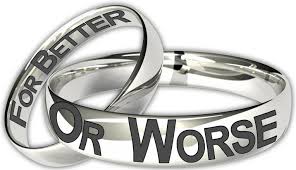How To Deal With Changes In Your Relationship After Weight Loss Surgery

Prior to having WLS, most of us had at least one person in our lives (a partner, parent, child, friend, etc.) that expressed concern about our health and longevity and supported our decision to have the WLS. That person had a stake in wanting us be alive, well, and in their life for the long haul. So we are understandably hurt and confused if the same person that initially supported and encouraged us begins to change their tune as we become healthier, thinner, more mobile and more social.
Obesity is often a family disease. The family is the core unit of all social relationships across cultures. Even if we are not connected to our original families anymore, we tend to recreate the family systems we grew up in with those closest to us. When one person in the family goes through major changes (like WLS) the rest of the system experiences “aftershocks,” like in an earthquake. In the Earth’s case, the “aftershock” is a natural way to release the remaining tension and pressure so equilibrium can be reestablished. In our loved ones case, I would argue that the same holds true.
When we lose weight and become more available to work, run errands, and socialize with others, those closest us may feel threatened and may (unconsciously) do or say things in an attempt to reestablish old roles, routines and responses. They don't do any of these things to consciously hurt us or make life harder for us. They are just trying to get back into equilibrium.
They just want life to feel “safe” again, on solid ground, like they did when we were over-weight and our roles were clearly defined, predictable and exclusive. It’s important to remember that our loved ones may be used to having us virtually all to themselves, so suddenly sharing us with a broader social network may be challenging and difficult for them to adjust to.
One of the biggest oversights in the WLS preparation process is the lack of education and communication about how our WLS will impact those around us. The focus of the preparation is generally on how the surgery will impact us, not on how our weight loss may effect those closest to us. This common (and often painful) oversight usually results in no one being adequately prepared to deal with the complicated range feelings that arise (all around us) as a result of our WLS.
The bottom line is, we all want to feel safe, loved and know that we belong.
Wanting safety, predictability and reassurance during any transition is a normal, natural response. We aren’t the only ones that need support during our WLS transition. Those closest to us are going through their own tough transitions; it’s just not as obvious, because there are no pounds and inches melting away before our very eyes.
So, if you’ve noticed that your loved ones are doing or saying things that feel like they are trying to sabotage your weight loss progress, or blame you for not being as available, you are not alone. But it may be helpful to understand that jealousy and sabotage (whether it’s self sabotage, or actions taken by another) can always be traced back to that deep desire to “protect” and preserve the equilibrium, or status quo—even when that status quo made everyone miserable! Because like it or not, even misery (that we are used to) is predictable, and change—even if it’s positive—is not.
It’s critical to understand that your family, close friends and loved ones need their own source of support to adjust to “the new you” in order for the transition to work for everyone. If your partner or family members are willing to acknowledge that your WLS transition is difficult for them too, that’s half the battle. The other half is getting everyone the support they need to make the transition as productive, healthy, and sustainable as possible.
Talking to our loved ones about getting the support they need is key, so we don’t resort back to old behaviors (like overeating) in an effort to make them (and us) more comfortable in the moment. So, the next time you find yourself getting confused, angry, or reaching for food you didn’t intend to eat after a loved one says or does something that triggers or hurts you, ask yourself if they may be feeling scared or threatened, and just looking for any way possible to get back to “normal” again.
If the people that matter most to you are willing to work together to explore, understand, and consider one another’s experiences and needs with respect and compassion, than you have a chance to make your relationships more meaningful and intimate than ever. With this sort of foundation, you can work through your collective transitions with a new appreciation and understanding of all that is possible for each of you now.
To do that, I recommend that you and your partner (or family) either participate in:
- Structured coaching, designed to help each person identify and implement practical strategies to move through his/her individual transition with more ease, understanding and support; or,
- Couples or family counseling (with a professional in your area) to help you work through more complicated, longer-term relationship issues.
Whatever you choose, understand that your WLS can be framed as an opportunity to increase the satisfaction and depth you experience in your closest relationships, or, it can be framed as something that shines a light on the growing divide between you and those closest to you. How you frame it, and the actions you take based on that belief, is up to you.
Great article, Jill!!
Thanks so much for letting me know that you enjoyed my article!!!
Great article ![]()
I credit counseling for helping my partners and I stay on an even keel. I expect there to be bumps in the road, but I'm hoping we stay strong through them.
Thanks for a great article! Another aspect of difficulty in relationships after weight loss surgery can be due to the fact that sometimes when we are overweight, we settle or tolerate certain situations, but as we lose weight and gain self confidence, we also realize that we are deserving of respect and happiness, and therefore choose to end toxic relationships. This has been my personal experience!
I completely agree! If we enter relationships when we are NOT in touch with our own value and worth, and then begin to feel better about ourselves, it is quite natural to want to have relationships that reflect where we are now…not where we used to be.
This can be quite scary for many couples, but by the same token, it's an opportunity for both individuals to get more clarity about what they each want and need. In some cases, this could mean leaving a relationship that doesn't support you to make healthy choices or take good care of yourself. In other cases, it might mean that both partners have "settled" in certain ways, and that they each need to do some work so that they can come to the partnership with new eyes, and more clarity about how they want to be with each other in the future.
The beautiful thing is…once we begin to get a sense of our non-negeociable self-worth, anything is possible.
I love that! "Non-Negotiable Self Worth"! ![]()
Excellent article.
.
Edited by JustWatchMe








PdxMan 4,292
Posted
Great article and while something I felt I had a grip on, I couldn't fully understand the whole situation until I was in the middle of it. I believe another large aspect which is not covered (unless I missed it) is the other person questioning themselves and the relationship.
"What is wrong with me that my partner feels they have to make this change? Wasn't everything great in our lives?"
Share this comment
Link to comment
Share on other sites